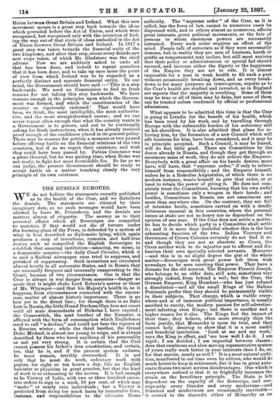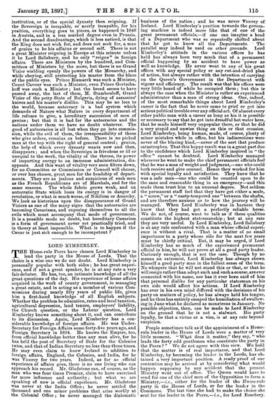THE RUSSIAN RUMOURS.
WE do not believe the statements recently published as to the health of the Czar, and we disbelieve the denials. The statements are vitiated by their imaginary date, as no such messages would have been allowed to leave St. Petersburg, and the denials are matters almost of etiquette. The secrecy as to their personal affairs which all Sovereigns are compelled to maintain if they would not die of torture under the burning-glass of the Press, is defended by a system of what is best described as diplomatic lying, which again produces a crop of inventions, rumours, and half-true stories fetch as compelled the English Sovereigns to ,e4ablish that amazing institution—amazing, we mean, in a democratic country—the daily Court Circular, which it is said a Radical newspaper once tried to suppress, and perished of suppressing. Such inventions are circulated almost hourly in all autocratic States, and in Russia they are unusually frequent and unusually exasperating to the -Court, because of two circumstances. One is that the Czar is always in real danger from assassins—danger so acute that it might shake Lord Roberts's nerves or those of Mr. Whym per—and that his Majesty's health is, as it happens, from circumstances connected with the succes- sion, matter of almost historic importance. There is no heir yet in the direct line ; for though there is no Salic Law in Russia,the little Grand Duchess Olga does not count until all male descendants of Nicholas I. have expired ; The Cesarewiteh, the next brother of the Emperor, is afflicted with the form of consumption which Englishmen used to call "a decline," and could not bear the rigours of a Russian winter ; while the third brother, the Grand Duke Michael, is almost too young to reign, and is always described by those who know anything of his personality as not yet very strong. It is certain that the Czar cannot possess his father's iron constitution, and certain, too, that he is, and if the present system endures, he must remain, terribly overworked. It is not only that he must do work, sedentary work with papers, for eight or ten hours a day, like an English barrister or physician in great practice, but that the kind of work is so exhausting to the nerves. It is bad enough to be Viceroy of India, with two or three hundred execu- tive orders to sign in a week, 10 per cent, of which may "make" or nearly ruin individuals ; but a Viceroy is protected from doing too much harm by immutable laws, customs. aid responsibilities to the ultimate Home authority. The "supreme order" of the Czar, as it is called, has the force of law, cannot in numerous cases be dispensed with, and in others almost as numerous, affects great interests, great political movements, or the fate of persons to whom enormous powers are necessarily intrusted. Every such order requires an effort of the mind. People talk of autocrats as if they were necessarily demons, but in reality they are men of business, harsh or gentle as temperament may incline, but still most anxious that their policy or administration or special fad should succeed, and increase either the dignity or the happiness of the Empire they are set to rule. It is almost impossible for a man in weak health to fill such a post without occasionally breaking down, and as every break- down is for many purposes an interregnum, reports as to the Czar's health are studied and invented, as in England are reports that the majority is revolting. Some of them may be true or all of them may be false, but none of them can be trusted unless confirmed by official or professional admissions.
What appears to be admitted this time is that the Czar is going to Livadia for the benefit of his health, which has been tried by his work, and by travelling through Europe with the unbearable burden of his autocracy still on his shoulders. It is also admitted that plans for re- lieving him, by the formation of a new Council which will sift business for him, have been considered, and it may be in principle accepted. Such a Council, it may be feared, will do but little good. There are Committees by the dozen already in Russia, and though they get through an enormous mass of work, they do not relieve the Emperor. Everybody with a great affair on his hands desires, must have, will have, that "supreme order," if only to relieve himself from responsibility ; and the Emperor himself, unless he is a Romulus Augustulus, of which there is no modern instance, wants himself to give that order, or at least to retain the power of giving it. He does not com- pletely trust the Committees, knowing that his own awful power is sometimes only a weapon in their hands ; and besides, Committees in Russia are not unanimous any more than anywhere else. On the contrary, they are full of intestine broils, sometimes carried on with a deadly bitterness unusual in free countries, where the personal issues at stake are not so heavy nor so dependent on the opinion of one man. If the Czar does not settle a matter, he has to decide which party in a Committee shall settle it; and it is more than doubtful whether this is the less exhausting function of the two. Indian Viceroys and Governors of Crown Colonies certainly do not find it so, and though they are not as absolute as Czars, the Czars neither wish to do injustice nor to affront and dis- hearten their own specially selected servants. Moreover —and this is in no slight degree the gist of the whole matter—Sovereigns with great power left them wish nowadays to be seen exerting that power. They have a distaste for the old screens. The Emperor Francis Joseph, who belongs to an older date, still acts, sometimes very strongly indeed, from behind a veil; but the Czar, the German Emperor, King Humbert—who has just refused a dissolution—and all the small Kings of the Balkan Peninsula prefer that they should be permanently visible to their subjects. That change, which is visible every- where and is of immense political importance, is usually ascribed to vanity, the modern passion for self-advertise- ment infecting even Kings ; but there is another and a higher reason for it also. The Kings feel the impact of their time ; they believe, often more strongly than the facts justify, that Monarchy is upon its trial, and they cannot help desiring to show that it is a most useful and beneficial institution. 'Look at me and my work,' says the King in effect, and 'see how well I do it. I am rapid; I am decided ; I am impartial between classes ; does that cumbrous and slow-moving representative system of yours really work better in your interests than I do, or, for that matter, nearly as well ? ' It is a most natural ambi- tion, manifested in our time even by editors, who would do much better to keep in retirement, but it has in great auto- cratic States two most serious disadvantages. One which is everywhere noticed is that it so frightfully increases the strain on the hereditary principle. The State is left dependent on the capacity of the Sovereign, and con- sequently every blunder and every misfortune—and blunders and misfortunes are occasionally inevitable— is carried to the discredit either of Monarchy as an institution, or of the special dynasty then reigning. If the Sovereign is incapable; or nearly incapable, for his position, everything goes to pieces, as happened in 1848 in Austria, and in a less marked degree even in Prussia. And the second disadvantage, which is less noticed, is that the King does not wish for, and does not seek for, a man of genius to be his adlatus or second self. There is not a great Minister reigning in Europe at this minute unless it be Lord Salisbury, and he only " reigns'? in 'foreign affairs. There are Ministers by the hundred, and Com- mittees of Ministers by. the score, but there is no Grand Vizier wielding openly the powers of the Monarchy, and while obeying, still protecting his master from the blaze of the public eyes. Prince Bismarck was 8 uch a Minister, Count Cavour was such a Minister, even Prince Gortscha- koff was such a. Minister ; but the breed seems to have passed away, the last of them, M. Stambouloff, Grand Vizier of the petty State of Bulgaria, dying of assassins' knives and his master's dislike. This, may be no loss to the world, because antecracy is a bad system which demands of Nature what Nature in every department of life refuses to give, a hereditary succession of men of genius ; but that it is bad for the autocracies and the nations under them we have no doubt whatever. The good of autocracies is all lost when they go into commis- sion, while the evil of them, the irresponsibility, of those who give orders, remains. as before. There is no picked man at the top with the right of general control; genius, the help of which every dynasty wants now and then, disappears ; and when the Sovereign is frivolous or ill or unequal to the work, the vitality of the throne, its power of imparting energy to an immense administration, dis- appears. And this want of vitality very soon filters down, for no Committee or Commission or Council will choose, or 'ever has chosen, great men for the headship of depart- ments. They are as jealous and suspicious of such men as the French Republicans are of Marshals, and for the same reasons. The whole fabric grows weak, and an autocratic State which loses its energy is in danger of revolution, or what is much worse, of or Anarchy. We look as historians upon the disappearance of Grand Viziers as one of the many sighs that the autocracies are becoming Caasarisms, and exposing themselves to all the evils which must accompany that mode of government. It is a possible mode no doubt, but hereditary Csesarism is a form of government never yet practically tried, and in theory at least impossible. What is to happen if the Ctesar is just sick enough to be incompetent ?



































 Previous page
Previous page